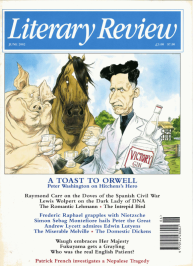Peter Washington
But What Was It?
Orwell’s Victory
By Christopher Hitchens
Allen Lane 150pp £9.99
This provoking short book about aspects of George Orwell – provoking in both senses, as its author might say – sits somewhat uneasily in the territory between polemic, personal memoir, thesis and biography. It is not helped by a mysterious title. What exactly is Orwell's Victory? Christopher Hitchens never tells us in so many words. At times the phrase seems to refer to the prescience of Animal Farm, 1984, and the letters and essays in which he describes how the postwar world might turn out. As the recent publication of his complete oeuvre has shown, Orwell combined the ability to look long and hard at reality with a remarkable talent for inferring accurate conclusions from limited information. He was also an acute critic of other political futurologists and, in so far as his views have outlived theirs, he has certainly conquered them. These are points Hitchens makes eloquently – and often – but they hardly justify the accolade of victory. Orwell wasn't always right and his outlook was coloured, like anyone else's, by temperament and prejudice. There were also other commentators, Churchill among them, who were just as far-sighted in their own ways, although Hitchens’s animus against the Right (of which more below) perhaps prevents him from saying so.
A more likely explanation for the title, given the amount of space devoted to it in this book, is that it refers to Orwell’s trouncing of his critics on the Left. Like many socialist writers, he relished a punch-up with the comrades, and Hitchens is not far behind him in

Sign Up to our newsletter
Receive free articles, highlights from the archive, news, details of prizes, and much more.@Lit_Review
Follow Literary Review on Twitter
Twitter Feed
It wasn’t until 1825 that Pepys’s diary became available for the first time. How it was eventually decrypted and published is a story of subterfuge and duplicity.
Kate Loveman tells the tale.
Kate Loveman - Publishing Pepys
Kate Loveman: Publishing Pepys
literaryreview.co.uk
Arthur Christopher Benson was a pillar of the Edwardian establishment. He was supremely well connected. As his newly published diaries reveal, he was also riotously indiscreet.
Piers Brendon compares Benson’s journals to others from the 20th century.
Piers Brendon - Land of Dopes & Tories
Piers Brendon: Land of Dopes & Tories - The Benson Diaries: Selections from the Diary of Arthur Christopher Benson by Eamon Duffy & Ronald Hyam (edd)
literaryreview.co.uk
Of the siblings Gwen and Augustus John, it is Augustus who has commanded most attention from collectors and connoisseurs.
Was he really the finer artist, asks Tanya Harrod, or is it time Gwen emerged from her brother’s shadow?
Tanya Harrod - Cut from the Same Canvas
Tanya Harrod: Cut from the Same Canvas - Artists, Siblings, Visionaries: The Lives and Loves of Gwen and Augustus John by Judith Mackrell
literaryreview.co.uk